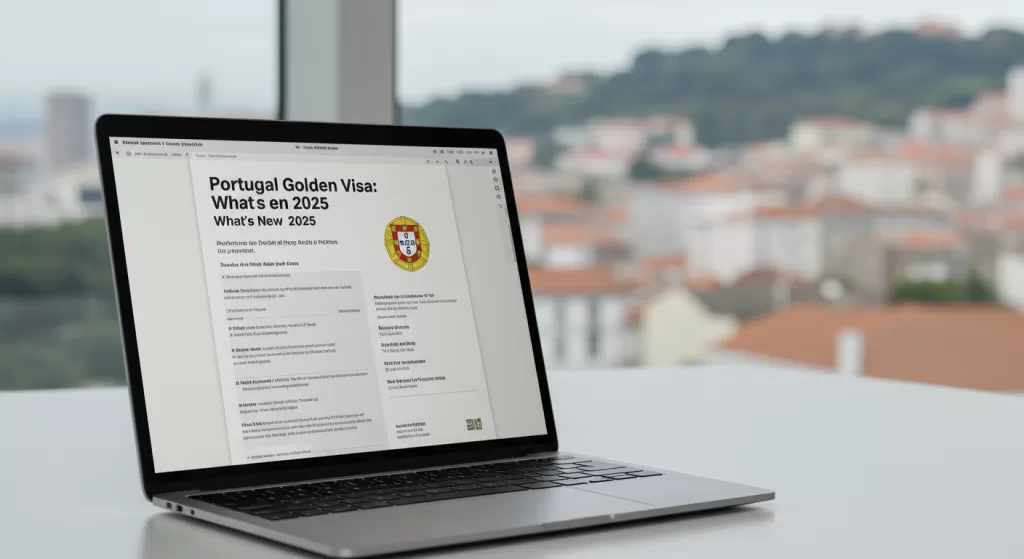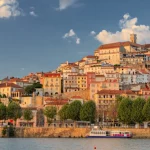
Portugal Golden Visa: What’s New in 2025
Portugal Golden Visa Changes: Your Essential Guide to Navigating the New Landscape 🇵🇹✨
Dreaming of sunny beaches, delicious pastéis de nata, and a relaxed European lifestyle? Portugal has long been a top pick for expats and digital nomads looking for a slice of paradise. For years, the Golden Visa program was the golden ticket for many looking to secure residency through investment. But here’s the scoop: the “Portugal Golden Visa changes” have been significant, shaking up the landscape for aspiring residents.
If you’ve been eyeing Portugal, you’ve likely heard whispers of new rules, closed doors, and shifting opportunities. Don’t fret! This comprehensive guide is here to untangle the complexities, explain exactly what’s changed, and show you the exciting new paths to making Portugal your home. Think of it as your friendly, no-nonsense roadmap to understanding the new way to move to this enchanting country. Let’s dive in!
Key Takeaways
- Real Estate is Out! 🚫 The biggest change to the Portugal Golden Visa is the complete removal of real estate investment as an eligible pathway. This was the most popular option, so it’s a game-changer.
- Capital Transfer Gone Too! 💸 Another popular option, the €1.5 million capital transfer, is also no longer available.
- Focus on Culture, Science & Business: The program now steers investments towards cultural heritage, artistic production, scientific research, job creation, and investment funds. These are the new golden gates!
- Alternatives Are Thriving: While the Golden Visa shifted, Portugal offers other fantastic visa options like the D7 (Passive Income), D2 (Entrepreneur), and Digital Nomad Visas, which are now more relevant than ever for many expats.
- AIMA Replaced SEF: The immigration authority (SEF) has been replaced by AIMA (Agency for Integration, Migrations and Asylum), aiming for a smoother, though still evolving, process.
The Golden Era: What Was the Portugal Golden Visa?
Before we dive into the “Portugal Golden Visa changes,” let’s quickly rewind. Launched in 2012, Portugal’s Golden Visa program, officially known as the Residence Permit for Investment Activity (ARI), was a runaway success. It was designed to attract foreign investment into the country, especially during a time of economic uncertainty. And boy, did it work!
The program offered a fast-track route to obtaining a residence permit in Portugal for non-EU citizens who made specific investments. The most popular options, by far, were:
- Real Estate Acquisition: This was the star of the show. Investing at least €500,000 in real estate, or €350,000 in rehabilitation projects (with lower thresholds for low-density areas), was the go-to choice for thousands of investors. Imagine buying a beautiful apartment in Lisbon or a charming villa in the Algarve and getting residency for it! It was a dream come true for many.
- Capital Transfer: Another highly popular choice was a capital transfer of at least €1.5 million (initially €1 million) into a Portuguese bank account.
- Job Creation: Creating at least 10 jobs in Portugal.
- Investment in Research Activities: A minimum investment of €500,000 (initially €350,000) in research activities carried out by public or private scientific research institutions.
- Investment in Artistic Production/National Heritage: A minimum investment of €250,000 (initially €250,000) in artistic production or the recovery/maintenance of national cultural heritage.
- Investment in Investment Funds/Venture Capital: A minimum investment of €500,000 (initially €350,000) in qualifying investment funds or venture capital funds.
- Company Incorporation: Investing €500,000 to incorporate or increase the share capital of a company, creating or maintaining at least 5 permanent jobs for a minimum of 3 years.
The appeal was clear: minimal stay requirements (just 7 days in the first year, and 14 days in subsequent two-year periods), the ability to include family members, and the ultimate path to Portuguese citizenship after five years. It was a sweet deal, offering not just residency but also access to the Schengen Area and a potential EU passport.
However, this popularity also brought challenges, particularly concerning housing affordability and market speculation, which ultimately led to the significant “Portugal Golden Visa changes.”
The Big Shift: Understanding the Portugal Golden Visa Changes
Fast forward to 2023. After much debate and anticipation, Portugal finally enacted major changes to its Golden Visa program. The “Mais Habitação” (More Housing) law, approved in September 2023 and effective from October 2023, completely reshaped the program. The primary goal? To address the country’s housing crisis and shift investment away from real estate speculation towards other areas of the economy.
Goodbye Real Estate, Hello Culture & Science! 👋
This is the headline news. The most significant of the “Portugal Golden Visa changes” is the complete removal of real estate acquisition and capital transfer as eligible investment options.
- No More Real Estate: You can no longer buy a property, whether residential or commercial, to qualify for the Golden Visa. This includes the direct purchase of property, urban rehabilitation projects, and even investments in low-density areas.
- No More Capital Transfer: The option of simply transferring a large sum of money (€1.5 million) into a Portuguese bank account is also off the table.
This means that if your plan was to buy a dreamy Lisbon apartment or a serene Algarve villa to get your Golden Visa, that specific door has now closed. 🚪
The ARI Program’s New Face: What’s Left? 💡
While real estate and capital transfer are gone, the Golden Visa program isn’t entirely abolished. It has simply pivoted its focus. The “Portugal Golden Visa changes” mean that eligible investments are now concentrated on:
- Investment Funds (The New King!): This option remains, with a minimum investment of €500,000. This involves subscribing to units in investment funds or venture capital funds that are dedicated to capitalizing companies, and that comply with specific requirements (e.g., non-real estate focus, at least 60% of investments in Portuguese companies). This has quickly become the most popular remaining route.
- Job Creation: Creating at least 10 jobs in Portugal. This option remains unchanged and focuses on boosting employment.
- Scientific Research: A minimum investment of €500,000 in research activities carried out by public or private scientific research institutions, integrated into the national scientific and technological system.
- Artistic Production / National Heritage: A minimum investment of €250,000 in artistic production, support for the arts, or the reconstruction or maintenance of national cultural heritage. This is about enriching Portugal’s cultural fabric.
- Company Incorporation / Capital Increase: Investing €500,000 to incorporate or increase the share capital of a company registered in Portugal, creating or maintaining at least 5 permanent jobs for a minimum period of 3 years. This option encourages entrepreneurial activity and stable employment.
“The Portugal Golden Visa changes signal a clear shift: from passive real estate investment to active contributions in culture, science, and job creation. It’s about building a stronger, more sustainable economy.”
The Impact on Current Applicants and Renewals 🔄
What about those who already applied or are in the process? Good news! The “Portugal Golden Visa changes” include a grandfathering clause.
- Existing Applications: If you submitted your Golden Visa application before the law came into effect (October 7, 2023), your application will be processed under the old rules. This means if you applied via real estate, your application should still proceed.
- Renewals: Existing Golden Visa holders and those who obtained their visa under the old rules will be able to renew their permits based on the original investment criteria. So, if you bought a property, you can continue to renew your Golden Visa based on that property.
However, a crucial point of the “Portugal Golden Visa changes” for renewals is the transition from SEF to AIMA. The immigration authority SEF (Serviço de Estrangeiros e Fronteiras) was dissolved in October 2023 and replaced by AIMA (Agency for Integration, Migrations and Asylum). This transition has, predictably, caused some delays and administrative hurdles. Patience is key during this period!
For more on navigating the visa and immigration process in Portugal, check out this guide: How to Apply for a Portuguese Visa Successfully.
Why the Change? The Reasons Behind the Portugal Golden Visa Changes
Understanding the “why” behind the Portugal Golden Visa changes helps put things into perspective. It wasn’t a sudden, arbitrary decision but the culmination of years of debate and growing public pressure.
Addressing Housing Concerns 🏘️
The primary driver for the changes was Portugal’s severe housing crisis. While the Golden Visa brought significant foreign investment, a large portion of it flowed into the real estate market, particularly in popular urban centers like Lisbon and Porto, and coastal areas. This influx of investment, coupled with a booming tourism sector and a lack of affordable housing, contributed to:
- Soaring Property Prices: Housing became increasingly unaffordable for many Portuguese citizens and long-term residents.
- Rental Market Squeeze: Rents skyrocketed, making it difficult for locals to find affordable places to live. You can learn more about finding housing in Lisbon here: Rent a Studio in Lisbon, Portugal: Find Your Home.
- Gentrification: Local communities felt displaced as neighborhoods transformed to cater to short-term rentals and high-end properties.
The government argued that the real estate-focused Golden Visa was exacerbating these issues, making it a target for reform. The removal of this option is a direct attempt to alleviate pressure on the housing market.
Shifting Investment Focus 📈
Beyond housing, the “Portugal Golden Visa changes” also reflect a desire to diversify the type of foreign investment Portugal attracts. The government wants to encourage contributions that are seen as more beneficial to the broader economy and society, rather than just property speculation.
- Boosting Innovation and Culture: By prioritizing investments in scientific research, artistic production, and cultural heritage, Portugal aims to strengthen its knowledge economy and preserve its rich cultural identity.
- Fostering Entrepreneurship: The continued emphasis on job creation and company incorporation aligns with the goal of nurturing a dynamic business environment and creating sustainable employment opportunities.
- Transparency and Regulation: There was also a growing global sentiment against “golden passport” schemes, with concerns about money laundering and lack of transparency. While Portugal’s program was generally well-regulated, the changes aim to align it more closely with international best practices and reduce any perceived risks.
So, while the Golden Visa might look different, the underlying intention is to channel foreign capital into areas that contribute more directly to Portugal’s long-term growth and social well-being.
Navigating the New Landscape: Alternative Paths to Portuguese Residency
With the “Portugal Golden Visa changes” putting real estate out of reach, many aspiring expats are asking: “What now?” The good news is that Portugal still offers several excellent, and often more accessible, visa options for those looking to move there. These visas are not new, but they’ve gained significant prominence since the Golden Visa reform.
The D7 Visa: For Passive Income Earners 💰
Often dubbed the “Retirement Visa” or “Passive Income Visa,” the D7 Visa is a fantastic option for individuals who can demonstrate a stable, regular passive income. This income should be sufficient to support themselves without needing to work in Portugal.
Who is it for?
- Retirees with pension income.
- Individuals with income from investments (stocks, bonds, dividends).
- Those with rental income from properties outside Portugal.
- Anyone with intellectual property royalties or other stable, non-employment income.
Key Requirements:
- Minimum Income: You’ll need to prove a minimum income equivalent to Portugal’s minimum wage. As of 2024, this is around €820 per month. For couples, it’s 150% of the minimum wage (€820 + €410 = €1230), and for each dependent child, an additional 30% (€246). It’s generally recommended to show significantly more than the minimum to demonstrate financial stability.
- Bank Account: You’ll need a Portuguese bank account with sufficient funds to cover your initial stay (usually 12 months of income).
- Accommodation: Proof of accommodation in Portugal (rental agreement or property deed).
- Clean Criminal Record: As with most visas, a clean criminal record is essential.
Benefits:
- Relatively straightforward application process.
- No investment required, just proof of income.
- Path to permanent residency and citizenship after 5 years.
- Access to the public healthcare system once resident.
- Ability to include family members.
The D7 visa is ideal for those who want to live in Portugal without needing to work, offering a peaceful transition to life in the sun.
The D2 Visa: For Entrepreneurs and Business Owners 🚀
If you’re an ambitious entrepreneur looking to launch a business or invest in an existing one in Portugal, the D2 Visa, also known as the Entrepreneur Visa, is your go-to. This visa is designed for individuals who want to contribute actively to the Portuguese economy.
Who is it for?
- Entrepreneurs planning to start a new business in Portugal.
- Individuals looking to invest in an existing Portuguese company.
- Freelancers or independent professionals with a solid business plan.
Key Requirements:
- Business Plan: A robust and viable business plan outlining your venture, its market potential, financial projections, and how it will contribute to Portugal’s economy (e.g., job creation, innovation).
- Investment: While there’s no fixed minimum, you’ll need to demonstrate sufficient capital to launch and sustain your business. This could be a modest investment, but it must be credible.
- Proof of Funds: Evidence that you have the financial means to support yourself during your stay in Portugal.
- Professional Qualifications: Relevant experience or qualifications related to your business.
- Clean Criminal Record: Standard requirement.
Benefits:
- Allows you to actively work and run a business in Portugal.
- Path to permanent residency and citizenship.
- Opportunity to tap into Portugal’s growing economy and expat community.
- Can include family members.
For those looking to find work or explore industries in Portugal, these resources are invaluable:
- Top Industries for Expats in Portugal: Where to Find Your Next Adventure
- Exploring Freelancing and Remote Work Opportunities in Portugal for 2025
- Essential Steps on How to Find a Job in Portugal: A 2025 Perspective
The Digital Nomad Visa: For Remote Workers 💻
Portugal launched its specific Digital Nomad Visa in October 2022, making it a prime destination for remote workers who want to enjoy the Portuguese lifestyle while working for employers or clients outside the country. This visa is not tied to the “Portugal Golden Visa changes” but offers an excellent alternative.
Who is it for?
- Individuals who work remotely for a company based outside Portugal.
- Freelancers or self-employed individuals whose clients are primarily outside Portugal.
Key Requirements:
- Proof of Remote Work: Contract of employment or service provision that proves your ability to work remotely.
- Minimum Income: You must demonstrate an average monthly income of at least four times Portugal’s minimum wage for the last three months. As of 2024, this is approximately €3,280 per month (€820 x 4).
- Tax Residency: While you’ll be residing in Portugal, your primary income source remains external.
- Accommodation: Proof of accommodation in Portugal.
- Clean Criminal Record: Standard requirement.
Benefits:
- Specifically designed for the modern remote worker.
- Offers a clear path to legal residency.
- Access to the NHR (Non-Habitual Resident) tax regime (though NHR has also seen changes, it can still offer benefits for certain income types).
- Path to permanent residency and citizenship.
- Can include family members.
Portugal has become a hub for digital nomads, with vibrant communities in cities like Lisbon and Porto, and charming towns like Lagos and Madeira. Discover the vibes of Madeira here: Vibes of Madeira, Portugal.
Other Paths to Residency
While the D7, D2, and Digital Nomad visas are the most popular alternatives to the Golden Visa post-changes, other options exist:
- Work Visa: If you secure a job offer from a Portuguese employer, you can apply for a work visa. This is a direct employment-based route. More info on working in Portugal: Working in Portugal.
- Study Visa: For those looking to pursue education in Portugal.
- Family Reunification: If you have immediate family members who are already legal residents in Portugal, you may be eligible to join them.
The key takeaway from the “Portugal Golden Visa changes” is that while one door has closed, many other welcoming doors remain open for those genuinely interested in contributing to and living in Portugal.

The Application Process Post-Changes: What to Expect
Applying for a Portuguese visa, regardless of the type, involves a series of steps. While the “Portugal Golden Visa changes” have altered the eligibility criteria for that specific program, the general application flow for other visas remains similar. However, it’s worth noting the recent administrative shifts.
Gathering Your Documents 📑
Preparation is key! For any Portuguese visa, you’ll need to compile a comprehensive set of documents. This typically includes:
- Passport: Valid for at least three months beyond your intended stay.
- Visa Application Form: Duly completed and signed.
- Passport-sized Photos: Recent, compliant with Schengen requirements.
- Proof of Accommodation: Rental agreement, property deed, or hotel booking for your initial stay.
- Proof of Financial Means: Bank statements, income declarations, or proof of investment (depending on the visa type).
- Health Insurance: Valid in Portugal and covering your entire stay.
- Criminal Record Certificate: From your home country and any country you’ve lived in for more than a year in the last five years.
- NIF (Número de Identificação Fiscal): Portugal’s tax identification number. You’ll need this early on.
- NISS (Número de Identificação da Segurança Social): Social security number, required if you plan to work.
Always check the specific requirements for your chosen visa type on the Portuguese Consulate or Embassy website in your country, as they can vary slightly.
The Role of Legal Assistance 🤝
Navigating the Portuguese immigration system, especially with the recent “Portugal Golden Visa changes” and administrative shifts, can be complex. While it’s possible to apply independently, many individuals opt for legal assistance.
- Expert Guidance: An immigration lawyer specializing in Portuguese residency can provide invaluable advice, ensuring you meet all requirements and avoid common pitfalls.
- Document Review: They can help you prepare and organize your documents, ensuring everything is correct and complete.
- Liaison with Authorities: Lawyers can often act as your representative, communicating with Portuguese authorities on your behalf, which can be particularly helpful with language barriers or bureaucratic delays.
- Staying Updated: They stay abreast of the latest “Portugal Golden Visa changes” and other immigration law updates, ensuring your application is always compliant.
Given the investment of time and resources involved, professional guidance can often save you stress and potential rejection. Fincou can connect you with the resources you need to get started on your journey to Portugal: https://fincou.com/
SEF (now AIMA) and Bureaucracy 🐢
The biggest administrative change alongside the “Portugal Golden Visa changes” is the dissolution of SEF and the creation of AIMA (Agency for Integration, Migrations and Asylum). This transition, which began in October 2023, is a massive undertaking and has led to some initial delays and confusion.
- What it means for you: When applying for or renewing a residence permit, you will now primarily interact with AIMA. While the goal is to streamline processes, it’s realistic to expect some teething problems.
- Patience is a Virtue: Be prepared for potential longer processing times, especially in the initial phase of AIMA’s operation. Regular follow-ups and clear communication are crucial.
- Online Portals: Portugal is increasingly moving towards online application portals, which can simplify some aspects, but technical glitches can occur.
While bureaucracy can be frustrating, remember that millions of people successfully move to Portugal every year. With proper preparation and, if needed, professional support, you can absolutely navigate the process.
Benefits of Portuguese Residency Beyond the Golden Visa
Even with the “Portugal Golden Visa changes,” the allure of Portuguese residency remains strong. The benefits



